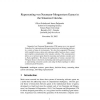796 search results - page 32 / 160 » The canonical function game |
IDC
2009
Springer
14 years 2 months ago
2009
Springer
Scheduling meetings among agents can be represented as a game - the Meetings Scheduling Game (MSG). In its simplest form, the two-person MSG is shown to have a price of anarchy (Po...
ACMACE
2005
ACM
13 years 9 months ago
2005
ACM
Current commercial AI middleware are still far from being a generic and flexible tool for developing computer games. Also the literature lacks proposals in this field. In this w...
JAIR
2008
13 years 7 months ago
2008
In this paper, we elucidate the equivalence between inference in game theory and machine learning. Our aim in so doing is to establish an equivalent vocabulary between the two dom...
CDC
2009
IEEE
14 years 12 days ago
2009
IEEE
— Since Witsenhausen put forward his remarkable counterexample in 1968, there have been many attempts to develop efficient methods for solving this non-convex functional optimiz...
AMAI
2004
Springer
13 years 7 months ago
2004
Springer
Sequential von Neumann-Morgernstern (VM) games are a very general formalism for representing multi-agent interactions and planning problems in a variety of types of environments. ...



